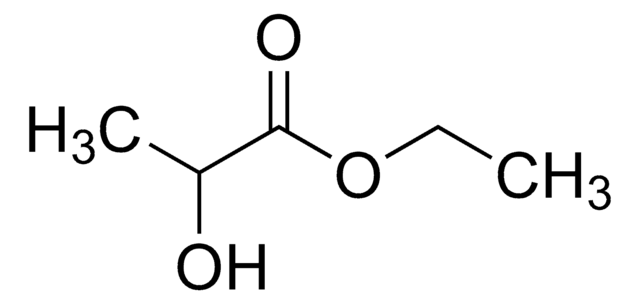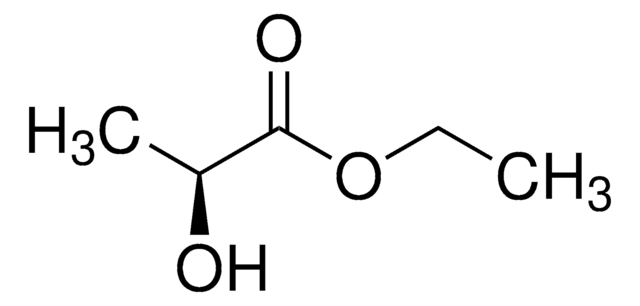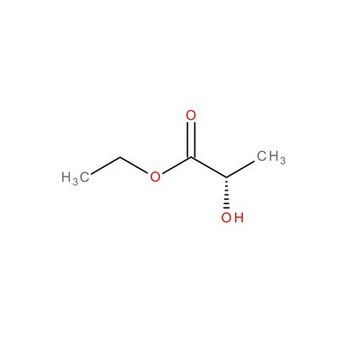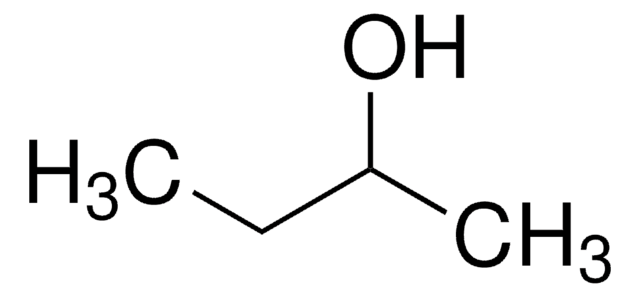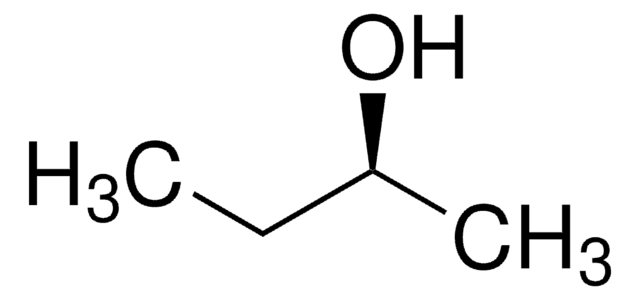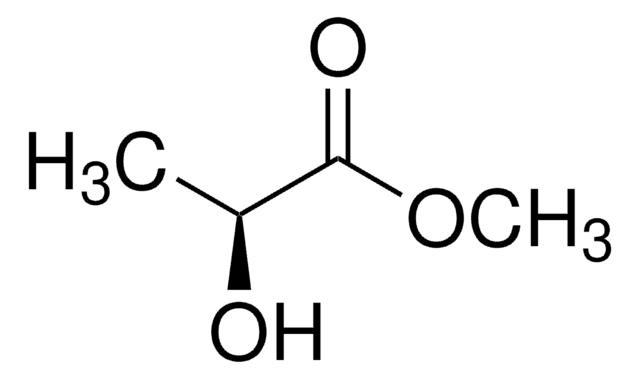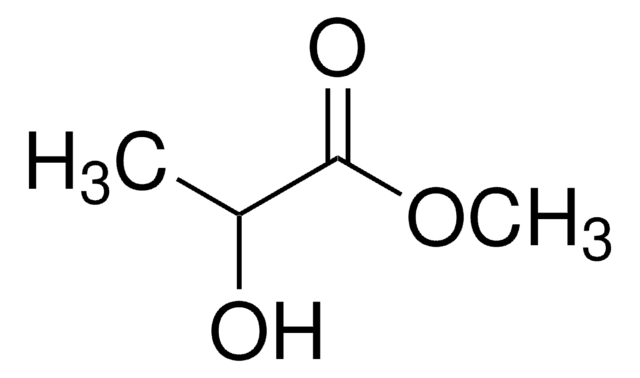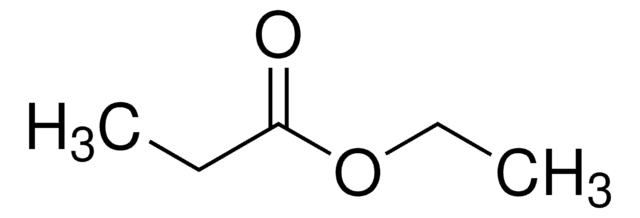W244015
Ethyl lactate
natural, ≥98%, FCC, FG
Synonym(s):
Ethyl 2-hydroxypropionate
About This Item
Fragrance grade
Kosher
natural
meets purity specifications of JECFA
Recommended Products
grade
FG
Fragrance grade
Kosher
natural
Quality Level
Agency
follows IFRA (guidelines)
meets purity specifications of JECFA
reg. compliance
EU (Regulation 1223/2009)
EU Regulation 1334/2008 & 178/2002
FCC
FDA 21 CFR 117
Assay
≥98%
optical activity
[α]20/D −10.5°, neat
greener alternative product characteristics
Less Hazardous Chemical Syntheses
Use of Renewable Feedstocks
Learn more about the Principles of Green Chemistry.
refractive index
n20/D 1.413 (lit.)
bp
154 °C (lit.)
density
1.031 g/mL at 25 °C (lit.)
application(s)
flavors and fragrances
Documentation
see Safety & Documentation for available documents
food allergen
no known allergens
fragrance allergen
no known allergens
greener alternative category
Organoleptic
butter; fruity
SMILES string
CCOC(=O)C(C)O
InChI
1S/C5H10O3/c1-3-8-5(7)4(2)6/h4,6H,3H2,1-2H3
InChI key
LZCLXQDLBQLTDK-UHFFFAOYSA-N
Looking for similar products? Visit Product Comparison Guide
General description
Application
- Microwave-Assisted Extraction of Secondary Metabolites Using Ethyl Lactate Green Solvent from Ambrosia arborescens: LC/ESI-MS/MS and Antioxidant Activity.: This paper demonstrates the use of ethyl lactate as a green solvent for extracting bioactive compounds from Ambrosia arborescens. The study shows that ethyl lactate is effective in enhancing the yield and antioxidant activity of the extracted metabolites, supporting its use in sustainable extraction processes (Guillen et al., 2024).
- Impact of indigenous Oenococcus oeni and Lactiplantibacillus plantarum species co-culture on Cabernet Sauvignon wine malolactic fermentation: Kinetic parameters, color and aroma.: Ethyl lactate is examined for its role in the malolactic fermentation process in wine production. The research highlights its contribution to the aroma and flavor profile of Cabernet Sauvignon, emphasizing the synergistic effects of microbial interactions (Zhang et al., 2024).
- Effect of osmotic dehydration combined with vacuum freeze-drying treatment on characteristic aroma components of peach slices.: This study investigates the use of ethyl lactate in preserving and enhancing the aroma of peach slices during dehydration and freeze-drying processes. The findings suggest that ethyl lactate helps retain key volatile compounds, improving the sensory qualities of the dried product (Wang et al., 2024).
Signal Word
Danger
Hazard Statements
Precautionary Statements
Hazard Classifications
Eye Dam. 1 - Flam. Liq. 3 - Skin Irrit. 2 - STOT SE 3
Target Organs
Respiratory system
Storage Class Code
3 - Flammable liquids
WGK
WGK 1
Flash Point(F)
114.8 °F - closed cup
Flash Point(C)
46 °C - closed cup
Personal Protective Equipment
Regulatory Listings
Regulatory Listings are mainly provided for chemical products. Only limited information can be provided here for non-chemical products. No entry means none of the components are listed. It is the user’s obligation to ensure the safe and legal use of the product.
FSL
Group 4: Flammable liquids
Type 2 petroleums
Hazardous rank III
Water insoluble liquid
ISHL Indicated Name
Substances Subject to be Indicated Names
ISHL Notified Names
Substances Subject to be Notified Names
JAN Code
W244015-10KG-K:4548173969336
W244015-1KG:
W244015-10KG:
W244015-SAMPLE-K:
W244015-1KG-K:4548173969343
W244015-BULK-K:
W244015-5KG:
W244015-SAMPLE:
W244015-5KG-K:4548173969350
W244015-VAR-K:
Choose from one of the most recent versions:
Already Own This Product?
Find documentation for the products that you have recently purchased in the Document Library.
Customers Also Viewed
Articles
Navigating the complexities of labeling flavors as natural in the EU is crucial for food manufacturers. Recent discussions on the use of genetically modified microorganisms in flavor production have sparked debate, potentially reshaping the definition of natural flavors.
Addressing consumer needs for religious and ethical food preferences is crucial in today's discerning market.
Our team of scientists has experience in all areas of research including Life Science, Material Science, Chemical Synthesis, Chromatography, Analytical and many others.
Contact Technical Service